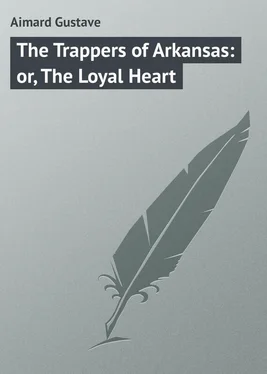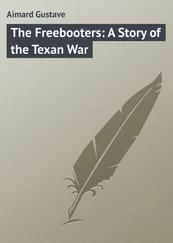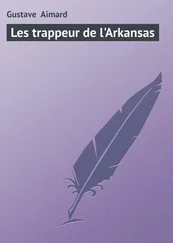Gustave Aimard - The Trappers of Arkansas - or, The Loyal Heart
Здесь есть возможность читать онлайн «Gustave Aimard - The Trappers of Arkansas - or, The Loyal Heart» — ознакомительный отрывок электронной книги совершенно бесплатно, а после прочтения отрывка купить полную версию. В некоторых случаях можно слушать аудио, скачать через торрент в формате fb2 и присутствует краткое содержание. Жанр: foreign_prose, foreign_adventure, на английском языке. Описание произведения, (предисловие) а так же отзывы посетителей доступны на портале библиотеки ЛибКат.
- Название:The Trappers of Arkansas: or, The Loyal Heart
- Автор:
- Жанр:
- Год:неизвестен
- ISBN:нет данных
- Рейтинг книги:3 / 5. Голосов: 1
-
Избранное:Добавить в избранное
- Отзывы:
-
Ваша оценка:
- 60
- 1
- 2
- 3
- 4
- 5
The Trappers of Arkansas: or, The Loyal Heart: краткое содержание, описание и аннотация
Предлагаем к чтению аннотацию, описание, краткое содержание или предисловие (зависит от того, что написал сам автор книги «The Trappers of Arkansas: or, The Loyal Heart»). Если вы не нашли необходимую информацию о книге — напишите в комментариях, мы постараемся отыскать её.
The Trappers of Arkansas: or, The Loyal Heart — читать онлайн ознакомительный отрывок
Ниже представлен текст книги, разбитый по страницам. Система сохранения места последней прочитанной страницы, позволяет с удобством читать онлайн бесплатно книгу «The Trappers of Arkansas: or, The Loyal Heart», без необходимости каждый раз заново искать на чём Вы остановились. Поставьте закладку, и сможете в любой момент перейти на страницу, на которой закончили чтение.
Интервал:
Закладка:
"Of what use is it, then?" the young lady asked, in a tone of curiosity.
"Of what use is it?"
"Yes."
"None at all, that I am aware of," the doctor replied, ingeniously.
Doña Luz broke into a silvery laugh, whose pearly notes might have made a nightingale jealous.
"And you call it a valuable plant?"
"Yes – if only for its rarity."
"Ah! that's all."
"Let us hope you will find it, doctor," said the general in a conciliatory tone. "Jupiter, call the chief of the guides hither."
The Negro left the tent, and almost immediately returned, followed by a Gambusino.
The latter was a man of about forty, tall in stature, square-built, and muscular. His countenance, though not exactly ugly, had something repulsive in it for which the spectator was at a loss to account; his wild, sinister-looking eyes, buried under their orbits, cast a savage light, which with his low brow, his curly hair, and his coppery complexion, made altogether a not very agreeable whole. He wore the costume of a wood ranger; he was cold, impassible, of a nature essentially taciturn, and answered to the name of the Babbler , which, no doubt, the Indians or his companions had given him by antiphrasis.
"Here, my good fellow," said the general, holding out to him a glass filled to the brim with a sort of brandy, called mescal, from the name of the place where it is distilled, "drink this."
The hunter bowed, emptied the glass, which contained about a pint, at a draught; then, passing his cuff across his moustache, waited.
"I wish," said the general, "to halt for a few days in some safe position, in order to make, without fear of being disturbed, certain researches; shall we be secure here?"
The eye of the guide sparkled: he fixed a burning glance upon the general.
"No," he replied, laconically.
"Why not?"
"Too many Indians and wild beasts."
"Do you know one more suitable?"
"Yes."
"Is it far?"
"No."
"At what distance?"
"Forty miles."
"How long will it take us to arrive there?"
"Three days."
"That will do. Conduct us thither. Tomorrow, at sunrise, we will set forward in our march."
"Is that all?"
"That is all."
"Good night."
And the hunter withdrew.
"What I admire in the Babbler," said the Captain, with a smile, "is that his conversation never tires you."
"I should like it much better if he spoke more," said the doctor, shaking his head. "I always suspect people who are so afraid of saying too much; they generally have something to conceal."
The guide, after leaving the tent, joined his companions, with whom he began to talk in a low voice, but in a very animated manner.
The night was magnificent; the travellers, assembled in front of the tent, were chatting together, and smoking their cigars.
Doña Luz was singing one of those charming Creole songs, which are so full of sweet melody and expression.
All at once a red-tinted light appeared in the horizon, increasing every instant, and a dull continuous noise, like the growling of distant thunder, was heard.
"What is that?" the general cried, rising hastily.
"The prairie is on fire," the Babbler replied, quietly.
At this terrible announcement, made so quietly, the camp was all in confusion.
It was necessary to fly instantly, if they did not choose to run the risk of being burnt alive.
One of the Gambusinos, taking advantage of the disorder, glided away among the baggage, and disappeared in the plain, after exchanging a mysterious signal with the Babbler.
CHAPTER V.
THE COMANCHES
Loyal Heart and Belhumeur, concealed among the tufted branches of the cork tree, were observing the Comanches.
The Indians depended upon the vigilance of their sentinels. Far from suspecting that their enemies were so near them and were watching their motions, they crouched or lay around the fires, eating or smoking carelessly.
These savages, to the number of twenty-five, were dressed in their buffalo robes, and painted in the most varied and fantastic manner. Most of them had their faces covered with vermillion, others were entirely black, with a long white stripe upon each cheek; they wore their bucklers on their backs, with their bows and arrows, and near them lay their guns.
By the number of wolves' tails fastened to their moccasins, and which dragged on the ground behind them, it was easy to perceive that they were all picked warriors, renowned in their tribe.
At some paces from the group, Eagle Head leant motionless against a tree. With his arms crossed on his breast, and leaning gently forward, he seemed to be listening to vague sounds, perceptible to himself alone.
Eagle Head was an Osage Indian; the Comanches had adopted him when quite young, but he had always preserved the costume and manners of his nation.
He was, at most, twenty-eight years of age, nearly six feet high, and his large limbs, upon which enormous muscles developed themselves, denoted extraordinary strength.
Differing in this respect from his companions, he only wore a blanket fastened round his loins, so as to leave his bust and his arms bare. The expression of his countenance was handsome and noble; his black, animated eyes, close to his aquiline nose, and his somewhat large mouth, gave him a faint resemblance to a bird of prey. His hair was shaved off, with the exception of a ridge upon the middle of his head, which produced the effect of the crest of a helmet, and a long scalp lock, in which was fixed a bunch of eagle's feathers, hung down behind him.
His face was painted of four different colours – blue, white, black, and red; the wounds inflicted by him upon his enemies were marked in blue upon his naked breast. Moccasins of untanned deerskin came up above his knees, and numerous wolves' tails were fastened to his heels.
Fortunately for the hunters, the Indians were on the warpath, and had no dogs with them; but for this, they would have been discovered long before, and could not possibly have approached so near the camp.
In spite of his statue-like immobility, the eye of the chief sparkled, his nostrils expanded, and he lifted his right arm mechanically, as if to impose silence upon his warriors.
"We are scented," Loyal Heart murmured, in a voice so low that his companion could hardly hear it.
"What is to be done?" Belhumeur replied.
"Act," said the trapper, laconically.
Both then glided silently from branch to branch, from tree to tree, without touching the ground, till they reached the opposite side of the camp, just above the place where the horses of the Comanches were hobbled to graze.
Belhumeur descended softly, and cut the thongs that held them; and the horses, excited by the whips of the hunters, rushed out, neighing and kicking in all directions.
The Indians rose in disorder, and hastened, with loud cries, in pursuit of their horses.
Eagle Head alone, as if he had guessed the spot where his enemies were in ambush, directed his steps straight towards them, screening himself as much as possible behind the trees which he passed.
The hunters drew back, step by step, looking carefully round them, so as not to allow themselves to be encompassed.
The cries of the Indians grew fainter in the distance; they were all in eager pursuit of their horses.
The chief found himself alone in presence of his two enemies.
On arriving at a tree whose enormous trunk appeared to guarantee the desired safety, disdaining to use his gun, and the opportunity seeming favourable, he adjusted an arrow on his bowstring. But whatever might be his prudence and address, he could not make this movement without discovering himself a little. Loyal Heart raised his gun, the trigger was pressed, the ball whizzed, and the chief bounded into the air uttering a howl of rage, and fell upon the ground.
Читать дальшеИнтервал:
Закладка:
Похожие книги на «The Trappers of Arkansas: or, The Loyal Heart»
Представляем Вашему вниманию похожие книги на «The Trappers of Arkansas: or, The Loyal Heart» списком для выбора. Мы отобрали схожую по названию и смыслу литературу в надежде предоставить читателям больше вариантов отыскать новые, интересные, ещё непрочитанные произведения.
Обсуждение, отзывы о книге «The Trappers of Arkansas: or, The Loyal Heart» и просто собственные мнения читателей. Оставьте ваши комментарии, напишите, что Вы думаете о произведении, его смысле или главных героях. Укажите что конкретно понравилось, а что нет, и почему Вы так считаете.












